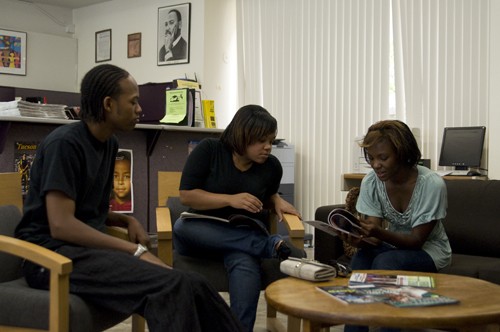President Robert Shelton and many members of the campus community take pride in the diversity of resources available to a diverse student body.
The four cultural centers on campus — African American Student Affairs, Asian Pacific American Student Affairs, Chicano/Hispano Student Affairs and Native American Student Affairs — provide a place on a large campus for both incoming and current students to really find their niche.
“”Having a sense of place is really important,”” said Amanda Tachine, director of Native American Student Affairs. “”(The center) allows for an environment that then plays into this large campus.””
Tachine said it is hard for her to pick any one resource as better than the others, because the existence of the center itself does so much for students.
Danthai Xayaphanh, director of Asian Pacific American Student Affairs, echoed a similar feeling.
“”We’re a great resource that students can find a home at on this campus,”” he said. “”We have study lounges here, we have tutors here.”” He added that the center in general is a hidden gem.
The Chicano/Hispano Student Affairs and African American Student Affairs centers have similar facilities for students as well.
In addition to services, the cultural centers are working to bring a number of speakers to campus this fall, according to Chicano/Hispano Director Socorro Carrizosa.
“”We are currently working on scheduling speakers and activities for Hispanic Heritage Month, along with planning the semester activities that will be led by the CHSA Student Programming Board,”” Carrizosa said.
The African American Student Affairs center also tries to provide a home for students on campus.
Home to all of the traditionally African American fraternities and sororities, as well as clubs such as the African Student Association, African Americans in Life Sciences and Black Graduate Student Association, AASA has its doors open for any questions, according to Brent Walker, student assistant to Maria Moore, director of African American Student Affairs.
“”AASA is open with student staff members (such as myself) to answer any questions a student may have about the center or campus,”” Walker said.
Besides providing specific facilities to the cultures they serve, the centers and their directors work together to promote awareness of all minorities on campus.
In partnership with campus communities such as the Women’s Resource Center, Transitions and the Associated Students of the University of Arizona, the centers have scheduled a welcome party on Aug. 25 to make students aware of the resources available to them on campus.
“”We usually do a welcome individually, but this year we are doing a collaboration,”” said Xayaphanh, who heads the organization of the event.
The focus on social justice and awareness will be prominent at the event, according to Xayaphanh. This focus is something Tachine also felt strongly influenced the mission of both Native American Student Affairs and the other cultural centers.
For incoming students, these centers provide a community within a community, and their directors had some advice for those new to the UA.
“”Get involved,”” Xayaphanh said. “”The more you get involved with your college, the more you’ll feel a part of it … and always seek help when you need it.””
Tachine followed that sentiment with an addition she felt is important for students.
“”Just be who you are and remember the morals and values that you were raised with. It’s important,”” Tachine said. “”You’ll get different viewpoints and different ideas, but remember who you are.””









